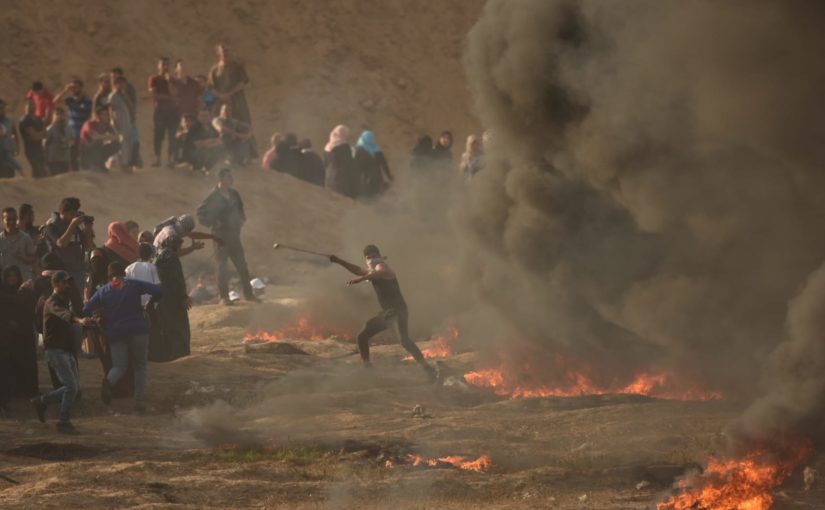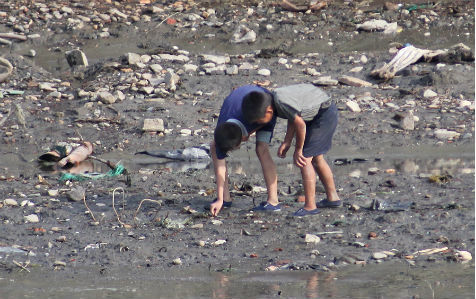Thousands of years ago, Israel’s King Solomon wrote that there is a time for peace and a time for war. The wise king understood that, while unpleasant, war is not always wrong. In fact, not making war at the right time is a grievous injustice. In the millennia since the Jewish monarch wrote, religious figures and philosophical traditions have grappled with the question of military conflict, and it is generally understood that there are just wars.
The events of October 7, 2023, make it perfectly clear: Now is the time for war.
Only a person completely devoid of morality – and sadly there are many, including many Western so-called “progressives” – could watch the events that transpired that morning in southern Israel and not realize that an unprecedented response was necessary, for both strategic and moral reasons.
Even now, the number of dead in Israel is still unknown; so far we are aware that about 1,200 innocents were murdered. We still don’t know how many people the savages of Hamas stole into captivity, except that the number is somewhere over 100 people. But numbers only tell part of the story.
The Barbarity
The pure savagery unleashed by Hamas after its fighters stormed into Israel by air, land, and sea continues to horrify all who are decent. Hundreds of young people were murdered simply because they happened to be at a desert music festival. The thugs raped many women and, while in the process, used the their victim’s cellphones to call their parents so that they could hear the sounds of their child being violated. They filmed themselves murdering an elderly woman and then used her phone to upload it to her own Facebook account so that her family could see.
Babies were dismembered. Initial reports were that 40 were found beheaded, but now the army can’t verify that this is the case. A friend in the Israel Defense Force (IDF) told me that the reason for the uncertainty is that the infants are literally in pieces; they’d been blown apart by machine guns, and it’s not possible to determine whether the heads came off first. Other babies were burned alive.
Under interrogation, a Hamas member was asked why women and children were captured. His answer, in Arabic: “To rape them.”
Israeli Prime Minister Benjamin Netanyahu eloquently described the evil, saying, “We saw the beasts of prey. We saw the barbarians that we are facing. We saw a cruel enemy. An enemy worse than ISIS. We saw boys and girls, bound, shot in the head. Men and women burned alive. Young women raped and slaughtered. Fighters decapitated… In one place, they set fire to tires around them, and burned them alive.”
These evildoers were so unencumbered by feelings of guilt as they slaughtered hundreds of Jews – more than had been murdered in any single day since the Holocaust – that they gleefully filmed their acts and posted them to social media, providing the world evidence of their crimes against humanity.
Anyone who reads the news reads accounts of brutality on a daily basis. Someone, somewhere does something ghastly to their family or their friend or their neighbor all too often. But this was different. What happened on October 7 was not some individual losing their mind. Instead, it was a well planned out, orchestrated campaign of terror directed by the governing entity of Gaza, Hamas.
Despite what progressives and those who style themselves as urbane sophisticates might tell you, the context does not matter. Whatever you think of Israel’s “occupation” of Palestine, whatever you think of their building settlements (apartment blocks) far away from Gaza in Area C of the West Bank, whatever you think of any of that simply doesn’t matter. There is no excuse, no context, nothing at all that could justify what the terrorists did.
The only option
After this, Hamas can no longer be allowed to govern Gaza. For years, Israel thought that they could live with Hamas next door, periodically “mowing the lawn,” their term for using rockets to destroy Hamas’s rocket launchers when they came too close to threatening Israel. October 7 made it clear that Israel cannot live with Hamas. The civilized world cannot live with Hamas. Thousands already do not live because of Hamas.
The Israel Defense Force has started what is likely to be a long, brutal fight against Hamas in Gaza. Hundreds of thousands of reservists have been mobilized. The war against Hamas is going to be ugly. Horrible images will fill television screens and other news media. Israel will be accused of atrocities.
Netanyahu stated clearly the intent of his government, saying, “Every Hamas member is a dead man.” Defense Minister Yoav Gallant said that Hamas “will be wiped from the face of the Earth. It will not continue to exist.” And Israel cannot simply kill Hamas; there needs to be some sort of government. It’s likely that Israel will need to retake control of the Gaza Strip, which they gave up nearly two decades ago in the interest of peace.
As always, the IDF will do its utmost to protect civilian lives. Well before fighting began, Netanyahu warned the civilians of Gaza to get out. But where should they go? The IDF has produced videos and maps warning people where bombs are likely to fall and where to go for safety. The IDF’s leaders know that Hamas will exploit this information and use it against Israeli soldiers, but protecting innocent life is part of the ethical DNA of Israel’s defense force.
Still, there will be “collateral damage,” a horrific term, because it sanitizes the information it conveys: civilians in Gaza will die. Hamas will continue to launch their rockets and fighting force not from legitimate military bases, but from schools and hospitals and apartment buildings and mosques. Israel will be obliged to destroy them. They will put children where the bombs will fall, aiming to score a pile of bodies that they can parade across television in order to accuse Israel of war crimes.
None of the above should be taken to mean that the lives of Gazans don’t matter. Gazan civilians – not members of Hamas and their supporters – are as human as any of the rest of us. A Gazan child or baby is as precious as any other. The point, though, is that Israel (and perhaps allies – there are American hostages in Gaza as well) has been forced to act. Any blood shed will be on the hands of Hamas.
Americans should resist the urge to call for “peace” or a “peace process.” As alluded to above, it was a move for peace, Israeli disengagement from Gaza, that brought Hamas to power.
No to negotiations
War is a horror show. And yet it is necessary. Not going to war after such evil as was perpetrated against the Israeli people on October 7 will leave the perpetrators unpunished. It will advertise to the world that Israel is open to having its children murdered and burnt, its women raped, its elderly killed on Facebook, its music festivals turned into killing fields. A price tag would be on the head of every Israeli.
The lack of a devastating response by Israel would have reverberations across the Middle East.
As ugly images fill television screens and atrocities attributed to Israel’s soldiers are shown, the liberal West will find a familiar temptation, the temptation to call for negotiations. But with Hamas, there can be no negotiation. Their charter calls for the elimination not only of Israel, but of the Jewish people as a whole. Negotiating with them would be useless, because there is nothing that Israel can offer, short of national suicide, that would appease the terror organization.
In historical context, we understand that war and its accompanying horrors are in certain situations not only morally acceptable, but morally necessary. The Civil War devastated civilians in the South. Some consider Sherman’s March to be the first iteration of what is now called “total war.” No one says the Civil War shouldn’t have been fought, that the Union should have negotiated with the Confederacy. World War II, which liberated Europe and ended the Holocaust, was marked by ghastly actions the Allied Forces deemed necessary, including the firebombing of Dresden and the atomic destruction of Hiroshima and Nagasaki. We don’t debate the morality of World War II.
Times have changed, and there are rules of war now. The IDF will follow those, as the U.S. did during the Gulf War. Even then, though, there was “collateral damage.”
Anyone who argues that now is not a time for war, that Israel should negotiate some kind of deal with Hamas instead of destroying them, has to either argue that Hamas is not as bad as the Nazis or the Confederacy or that America’s entrance into World War II and the Union’s entrance into the Civil War were grave injustices.
Does anyone want to make these arguments?
Our Duty
Our duty as Americans and others who support civilization over savagery is to push back against those who would call for the immorality of letting Hamas maintain its rule over Gaza. We cannot let the ugly pictures that will show up in the media in the coming days, weeks, and months cause us to demand Washington stay Israel’s hand as it roots out Hamas and its affiliates, like the Palestinian Islamic Jihad, and, likely, retakes control of Gaza.
Already, people like Reps. Ilhan Omar, D-Minn., and Rashida Tlaib, D-Mich., are already calling for the U.S. to use our power to restrain Israel. Even senators who clearly don’t hate Jews, like Massachusetts’ Ed Markey, have started calling for the injustice of a fake “peace” already. Thankfully, President Biden has more moral clarity than they do, but his co-partisans are likely to exert pressure on him to change course. The more the horrors of war appear on television, the more strength they will have. It is unlikely that Israel will allow itself to be restrained, given what they’ve just been through. Still, a supportive United States allows Israel a free hand to conduct the war as they see fit, within the confines of the IDF code of ethics. The world did not attempt to tell the U.S. how to respond after 9/11, and we should not do that to Israel. Instead, we should work to ensure that America leads the world in support for Israel, encouraging fickle European allies not to waver.
We have to maintain moral clarity. While it is fashionable now to engage in moral equivalence and to deny the existence of good and evil, doing so is wrong. Hamas is evil. Israel’s response, as they go to war against evil, is just.
And there is no alternative.

